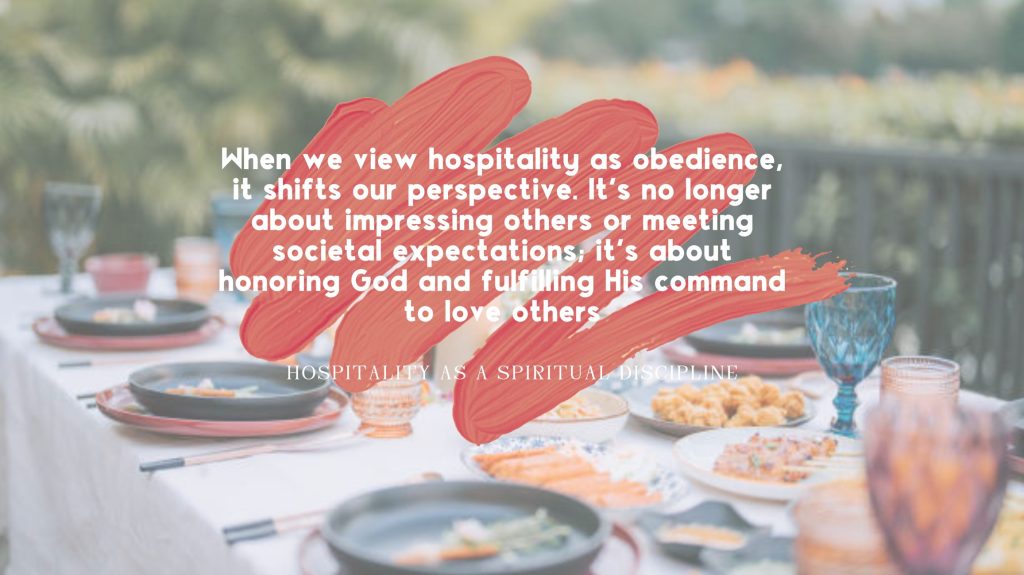Hospitality as a Spiritual Discipline: Drawing Closer to God Through Generosity
In a world where busyness reigns and relationships are often reduced to hurried interactions, hospitality may seem like an optional practice—a “nice-to-have” but not a necessity. However, the Bible paints a very different picture. Hospitality is not just an act of kindness; it is a spiritual discipline that shapes our hearts and helps us grow closer to the heart of God.
When we practice hospitality intentionally, it becomes a means of discipleship. It requires us to slow down, prioritize others, and reflect God’s love in tangible ways. Far from being an afterthought, hospitality is a spiritual exercise that deepens our faith and invites God to work through us.
What Is a Spiritual Discipline?
Spiritual disciplines are practices that draw us closer to God. Just as physical disciplines like exercise strengthen the body, spiritual disciplines—such as prayer, fasting, and studying Scripture—strengthen our relationship with God. They are not about earning favor with Him but about creating space for His transformative work in our lives.
Hospitality fits beautifully into this framework. It aligns with Jesus’ teaching to love God and love our neighbor:
Matthew 22:37-39 (NLT): “You must love the Lord your God with all your heart, all your soul, and all your mind. This is the first and greatest commandment. A second is equally important: Love your neighbor as yourself.”
When we open our homes and hearts to others, we practice obedience, selflessness, and love—qualities central to the Christian life.
Hospitality Challenges Our Flesh
One of the reasons hospitality is such a powerful spiritual discipline is that it challenges our flesh. True hospitality requires us to move beyond our comfort zones and preferences.
1. It Confronts Our Selfishness
It’s easier to keep to ourselves. Opening our homes and lives to others requires effort, vulnerability, and sacrifice. The Bible reminds us:
Philippians 2:3-4 (NLT): “Don’t be selfish; don’t try to impress others. Be humble, thinking of others as better than yourselves. Don’t look out only for your own interests, but take an interest in others, too.”
Hospitality forces us to prioritize the needs of others over our convenience, reflecting Christ’s humility and servant-heartedness.
2. It Teaches Us to Depend on God
Practicing hospitality can feel overwhelming, especially when we feel unprepared or inadequate. But this is where God meets us:
2 Corinthians 12:9 (NLT): “My grace is all you need. My power works best in weakness.”
When we step out in faith and invite others in, even when it feels inconvenient or imperfect, we are reminded that God’s strength is made perfect in our weakness.
Hospitality Cultivates the Fruit of the Spirit
Hospitality is fertile ground for spiritual growth. It creates opportunities for God to cultivate the fruit of the Spirit in us:
- Love: Welcoming others into our homes teaches us to love sacrificially, just as God loves us.
- Joy: There is joy in building relationships and seeing others feel valued and cared for.
- Peace: Hospitality helps us create environments of peace where people feel safe and accepted.
- Patience: Hosting others often requires patience, especially when plans don’t go smoothly.
- Kindness and Goodness: Offering a meal, a warm smile, or a listening ear reflects God’s kindness.
- Faithfulness: Regular hospitality teaches us to be consistent in showing God’s love.
- Gentleness and Self-Control: Hospitality encourages us to approach others with gentleness and set aside our desires for others’ sake.
As we practice hospitality, the Holy Spirit works in us, shaping us to be more like Christ.
Hospitality as Obedience to God
In Scripture, hospitality is not presented as a suggestion—it is a command:
Romans 12:13 (NLT): “When God’s people are in need, be ready to help them. Always be eager to practice hospitality.”
When we view hospitality as obedience, it shifts our perspective. It’s no longer about impressing others or meeting societal expectations; it’s about honoring God and fulfilling His command to love others.
Practical Ways to Develop Hospitality as a Spiritual Discipline
- Start Small: Hospitality doesn’t have to be extravagant. Begin with something simple, like inviting a neighbor over for coffee or sharing a meal with a friend.
- Create a Rhythm: Build hospitality into your life by setting aside regular times to host others. Whether it’s a weekly dinner or a monthly gathering, consistency helps make hospitality a natural part of your routine.
- Pray for Opportunities: Ask God to show you who needs His love and how you can extend it through hospitality. Be open to His leading, even when it feels inconvenient.
- Focus on People, Not Perfection: Remember that hospitality is about relationships, not impressing others. A humble and welcoming spirit is far more valuable than a perfect home or meal.
- Invite God into the Process: Before hosting, take time to pray. Ask God to bless your efforts, guide your conversations, and work in the hearts of your guests.
Hospitality as Worship
Ultimately, hospitality is an act of worship. When we open our homes and lives to others, we offer God our time, resources, and love. We are saying, “Lord, use me to reflect Your heart and build Your kingdom.”
As you embrace hospitality as a spiritual discipline, remember that it’s not about perfection or performance. It’s about creating space for God to work—both in your life and in the lives of those you welcome.
The next time you feel hesitant to host, remind yourself that hospitality is an opportunity to draw closer to God. In serving others, you are serving Him.



